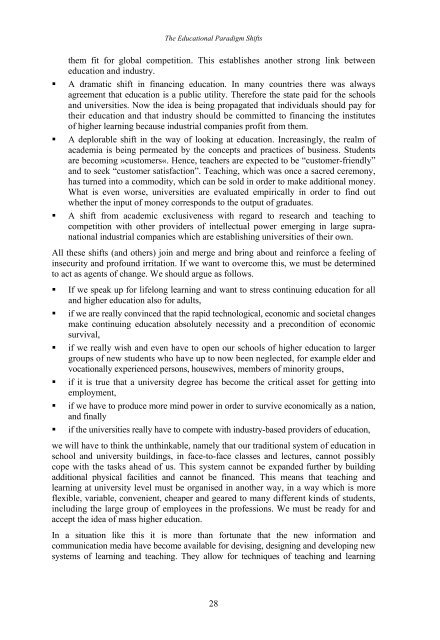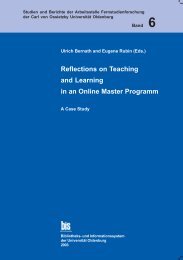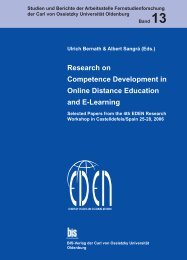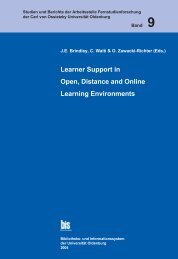Distance Education in Transition - Master of Distance Education ...
Distance Education in Transition - Master of Distance Education ...
Distance Education in Transition - Master of Distance Education ...
Create successful ePaper yourself
Turn your PDF publications into a flip-book with our unique Google optimized e-Paper software.
The <strong>Education</strong>al Paradigm Shifts<br />
them fit for global competition. This establishes another strong l<strong>in</strong>k between<br />
education and <strong>in</strong>dustry.<br />
� A dramatic shift <strong>in</strong> f<strong>in</strong>anc<strong>in</strong>g education. In many countries there was always<br />
agreement that education is a public utility. Therefore the state paid for the schools<br />
and universities. Now the idea is be<strong>in</strong>g propagated that <strong>in</strong>dividuals should pay for<br />
their education and that <strong>in</strong>dustry should be committed to f<strong>in</strong>anc<strong>in</strong>g the <strong>in</strong>stitutes<br />
<strong>of</strong> higher learn<strong>in</strong>g because <strong>in</strong>dustrial companies pr<strong>of</strong>it from them.<br />
� A deplorable shift <strong>in</strong> the way <strong>of</strong> look<strong>in</strong>g at education. Increas<strong>in</strong>gly, the realm <strong>of</strong><br />
academia is be<strong>in</strong>g permeated by the concepts and practices <strong>of</strong> bus<strong>in</strong>ess. Students<br />
are becom<strong>in</strong>g »customers«. Hence, teachers are expected to be “customer-friendly”<br />
and to seek “customer satisfaction”. Teach<strong>in</strong>g, which was once a sacred ceremony,<br />
has turned <strong>in</strong>to a commodity, which can be sold <strong>in</strong> order to make additional money.<br />
What is even worse, universities are evaluated empirically <strong>in</strong> order to f<strong>in</strong>d out<br />
whether the <strong>in</strong>put <strong>of</strong> money corresponds to the output <strong>of</strong> graduates.<br />
� A shift from academic exclusiveness with regard to research and teach<strong>in</strong>g to<br />
competition with other providers <strong>of</strong> <strong>in</strong>tellectual power emerg<strong>in</strong>g <strong>in</strong> large supranational<br />
<strong>in</strong>dustrial companies which are establish<strong>in</strong>g universities <strong>of</strong> their own.<br />
All these shifts (and others) jo<strong>in</strong> and merge and br<strong>in</strong>g about and re<strong>in</strong>force a feel<strong>in</strong>g <strong>of</strong><br />
<strong>in</strong>security and pr<strong>of</strong>ound irritation. If we want to overcome this, we must be determ<strong>in</strong>ed<br />
to act as agents <strong>of</strong> change. We should argue as follows.<br />
� If we speak up for lifelong learn<strong>in</strong>g and want to stress cont<strong>in</strong>u<strong>in</strong>g education for all<br />
and higher education also for adults,<br />
� if we are really conv<strong>in</strong>ced that the rapid technological, economic and societal changes<br />
make cont<strong>in</strong>u<strong>in</strong>g education absolutely necessity and a precondition <strong>of</strong> economic<br />
survival,<br />
� if we really wish and even have to open our schools <strong>of</strong> higher education to larger<br />
groups <strong>of</strong> new students who have up to now been neglected, for example elder and<br />
vocationally experienced persons, housewives, members <strong>of</strong> m<strong>in</strong>ority groups,<br />
� if it is true that a university degree has become the critical asset for gett<strong>in</strong>g <strong>in</strong>to<br />
employment,<br />
� if we have to produce more m<strong>in</strong>d power <strong>in</strong> order to survive economically as a nation,<br />
and f<strong>in</strong>ally<br />
� if the universities really have to compete with <strong>in</strong>dustry-based providers <strong>of</strong> education,<br />
we will have to th<strong>in</strong>k the unth<strong>in</strong>kable, namely that our traditional system <strong>of</strong> education <strong>in</strong><br />
school and university build<strong>in</strong>gs, <strong>in</strong> face-to-face classes and lectures, cannot possibly<br />
cope with the tasks ahead <strong>of</strong> us. This system cannot be expanded further by build<strong>in</strong>g<br />
additional physical facilities and cannot be f<strong>in</strong>anced. This means that teach<strong>in</strong>g and<br />
learn<strong>in</strong>g at university level must be organised <strong>in</strong> another way, <strong>in</strong> a way which is more<br />
flexible, variable, convenient, cheaper and geared to many different k<strong>in</strong>ds <strong>of</strong> students,<br />
<strong>in</strong>clud<strong>in</strong>g the large group <strong>of</strong> employees <strong>in</strong> the pr<strong>of</strong>essions. We must be ready for and<br />
accept the idea <strong>of</strong> mass higher education.<br />
In a situation like this it is more than fortunate that the new <strong>in</strong>formation and<br />
communication media have become available for devis<strong>in</strong>g, design<strong>in</strong>g and develop<strong>in</strong>g new<br />
systems <strong>of</strong> learn<strong>in</strong>g and teach<strong>in</strong>g. They allow for techniques <strong>of</strong> teach<strong>in</strong>g and learn<strong>in</strong>g<br />
28





